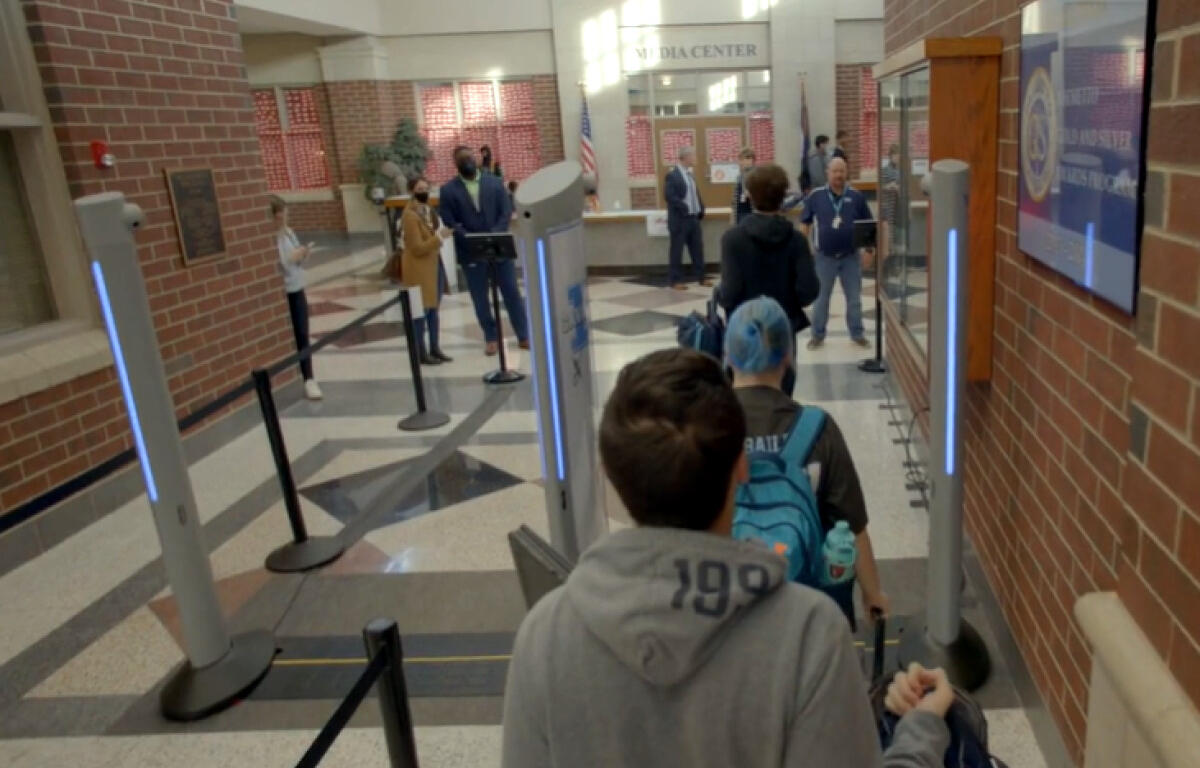CLARKSVILLE, TN (CLARKSVILLE NOW) – A new weapons detection system will be tested at a Clarksville-Montgomery County high school this fall, under a proposal the county is considering.
Members of the county Budget Committee heard the proposal from Sheriff John Fuson to beta test the project at one of the schools. He said the district needs to be proactive when it comes to protecting our schools and the children inside them.
Evolv Technolgies
The weapons detection system, Evolv Express, comes from Evolv Technolgies. According to Fuson, there’s several models to the technology, but the model they would pursue would be “dual lane.” The dual lane model expands to about 24 feet of open space for students to walk through, and it has the capacity to read up to 4,100 people per hour.
According to their website, Evolv Express is designed to, “accelerate physical security screening while maintaining the highest degree of weapons detection accuracy. It eliminates the friction that visitors, fans, patrons, employees and students typically experience moving through security by screening them in a touchless manner. This helps reduce the security risk of crowded security lines. It also drastically reduces false alarm rates and human errors by security guards.”
Other systems are also being considered.
The County Commission will be asked to approve funding for the system next month. It would cost somewhere around $230,000 for one dual lane unit. If purchased, the technology would be covered for four years and the company would perform maintenance updates when needed. After four years, the county could then extend the contract.
How the idea originated
Fuson told Clarksville Now that they’ve been looking at the technology for about two years.
“Anytime technology comes out, it always improves over time. When it first came out, you started seeing it at businesses, some folks complained that it was too club-footed, too sensitive or the software wasn’t where it needed to be yet,” he said.
“Over time, really over the last year, they’ve really been able to fine tune and get the software where it needs to be. Even the hardware, dialing it in where it can pick up something as sensitive as an ink pen, or as something as large as a rifle. So, I think the way the software is changing over the years, I knew it would get better. As we start seeing it in more businesses now and larger venues, I definitely think they have a lot of the kinks worked out where we can at least try it here and see how we can implement it here in our school district.”
Across the country, around 22 school districts are now using the software, he said.
On May 1, a team of county officials will travel to Champaign, Illinois, where the system has been implemented, to look at the system first-hand.
Fuson said the technology is needed because we have such a large school system, and the technology will continue to improve.
“I’ve always felt that we’ve done a lot to help improve school safety, both with active and inactive means. Whether it be staff, equipment or training. But this is the biggest investment that we’ve made for something that will actively keep weapons out of our schools. I think we need to take a look at that, and that’s exactly what we’re trying to do.”
Where will the system be placed?
For the beta test, Fuson said it would make the most sense to place the weapons detection system at Northwest High School, since that is the only high school in the district that has only one entrance for students to use.
“The communication process will be important for us,” Fuson said. “We want to make sure Northwest High School, or any other high school we decide to seed this program in, understands why. We don’t want schools with certain demographics to suggest we’re doing that just because of those demographics.
“We’re trying to seed it where it can be most successful; that way we get a full evaluation of how it works and what resources it would take to implement that systemwide. That will take some work and will certainly take some communication with the parents and the public, that way everyone understands what’s going on.”
First in Tennessee
Anthony Johnson, CMCSS spokesman, said the school system and MCSO have been working together to study the options. After determining that traditional metal detectors wouldn’t be feasible district-wide, they came upon this new technology solution.
“Unlike metal detectors, manual bag checks, wanding, and other traditional solutions, Evolv offers an innovative and accelerated approach to physical security screening and weapons detection through enhanced sensors and artificial intelligence (AI),” Johnson said.
“From our understanding, there are no other school districts in Tennessee using this technology, but we have been in contact with out-of-state school districts to get their feedback on these devices,” he said.
CMCSS and MCSO will visit a school system in Illinois this month to see the system in action. MCSO has identified funding for a pilot program, Johnson said.
“There are still details to work out, but we are initially recommending mobile units that could be piloted at multiple campuses to determine logistics and feasibility with various building and campus layouts. If we move forward with the pilot, we will ensure stakeholders receive timely and transparent communication.”
What’s next
The Budget Committee approved putting the weapons detection system on the County Commission agenda for next month.
At the May 1 meeting, the County Commission will discuss the proposal. Then they will vote on May 8. County Commission meetings are open to the public and held at 6 p.m. on the third floor of the County Courthouse.


